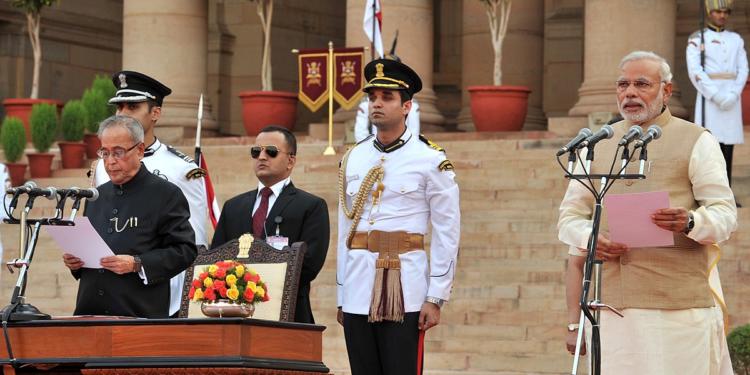The Narendra Modi Government has evidently been one of the most efficient governments to lead the nation post independence. With more than 1,53,00,000 houses constructed under the PM Awas Yojana, 24,02,601 free treatments done under the PM jan Arogya Yojana, 14,24,00,000 insurance covers provided under the PM fasal bima Yojana and other millions of benefits given to farmers, backward and economically weaker sections, Narendra Modi government has truly been a government for all. As major economic reforms like the introduction of GST and the Insolvency and Bankruptcy Code are poised to benefit the Nation in the future, the Mudra Yojana has given a huge push to all budding entrepreneurs. On the macro scale India has started marching with the world not as just another responsible member but as a trusted world leader.
These general elections have evidently been seeing the effects of all the efforts made by the Modi government over the past few years, with the nation expecting a comfortable NDA victory in at least the 2019 general elections. As NDA 3.0 takes its place in the centre few issues certainly top the list of expectations of 1.3 billion Indians.
Grand Ram Temple in Ayodha:
What started as a movement to restore the cultural heritage of India was soon hijacked by ‘secular’ parties to be used as a tool for portraying minority victimisation and ultimately to consolidate their vote banks. The Grand Ram Temple in Ayodha has since been a major yearning in the heart of every Indian. Efforts by the Modi government have been right on the path and completely under the ambit of the constitution contrary to what few opposition parties had been propagating before the change of regime in 2014. The construction of Ram temple has been facing continuous resistance from the so called ‘secular’ forces in the various forms of intellectual and legal roadblocks. However NDA 3.0 with greater strength in both Lok Sabha and Rajya Sabha is poised to give a major push to the construction of a Grand Ram temple in Ayodhya under the legal process.
Uniform Civil Code:
The progressive steps taken by the Modi Government to bring in the landmark law on Triple Talaq also stirred the debate on securing a Uniform Civil Code throughout India. Article 44 (Directive Principles of State Policy) of the Indian Constitution which comes under the Directive Principles of State Policy says that the State shall endeavor to secure for the citizens a uniform civil code throughout the territory of India. Though non-justifiable in nature i.e. without any guarantee to be enforced via the court and article 44 lays down an important requirement for India to move forward in the 21st century and do away archaic practices like unilateral divorce and others. UCC will also be a huge a huge boost to the women rights and provide a streamlined legal basis for future generations.
Educational Reforms:
The transition of the British East India Company’s rule to the rule of the British crown further magnified the need to introduce a British inclined education system. This education system was used to create human resource required to aid British imperialistic rule over India. The Communist ideologues which later got the hold over the education system under various regimes for the major part continued with the skewed system with minor alterations to suit their agenda. However NDA 3.0 is sure to build on the developments during NDA 2.0 like introduction of Vedic Education Board and SYAWAM (indigenous MOOC platform). Education curricula is also in a dire need to be updated to the current standards with inclusion of major parts which have been largely kept underrepresented or have been totally absent.
Abrogation of Article 370:
Over the past few years, Jammu and Kashmir has been witnessing various security operations to clear out the terror elements which have been perpetuating under the patronage of local ‘political’ leadership and foreign support. Driven by basic power politics and aided by Pakistan these terrorist organizations have been bleeding Kashmiri people by luring youth into this ‘Jihad’. Abrogation of Article 370 provides the final basis for complete integration of the people of Jammu and Kashmir with the rest of India. Abrogation of Article 370 has been facing strict resistance from separatist forces under the patronage of few local political forces, However with expected greater strength in the Parliament NDA 3.0 is sure to push towards complete integration of the people of Jammu and Kashmir in the mainstream Indian development train. Article 370 gives autonomous status to the state of Jammu and Kashmir, which has been used by separatist forces to isolate Kashmiri’s from mainstream Indian society.
Citizenship (Amendment) Bill:
The landmark Citizenship (Amendment) Bill 2016, which aims to provide a basis for the sound verification of Indian nationals and providing home to persecuted religious minorities from neighboring nations. C(A)B will provide Hindus, Sikhs, Buddhists, Jains, Parsis and Christians, who have been continually facing persecution by the hands of radical elements in neighboring nations, to have a legal basis for obtaining Indian citizenship. The Bill also seeks to reduce the requirement of 11 years of continuous stay in the country to six years to obtain citizenship by naturalization. With renewed support in Northeastern states NDA 3.0 is expected to ramp up its efforts towards getting this bill passed and providing homes to thousands of victims of persecution.
BJP in its manifesto for the 2019 general election has indicated towards working towards various dimensions of the expectations of 1.3 billion Indians. These general elections have been seeing political parties making unsustainable promises in desperation however looking back at the 5 years under PM Modi these issues are sure to be tackled with greater force than compared to various previous regimes.





























